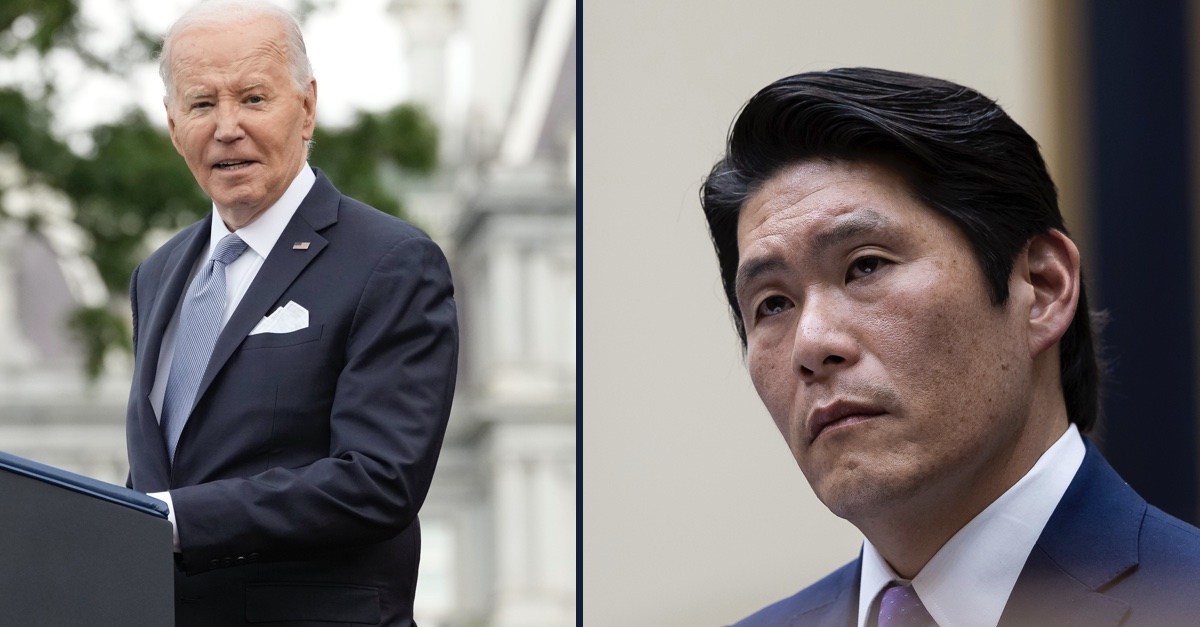
President Joe Biden (left) speaks on May 23, 2024. (AP Photo/Jacquelyn Martin); (right) special counsel Robert Hur testifies before the House Judiciary Committee on March 12, 2024. (Francis Chung/POLITICO via AP Images)
The U.S. Department of Justice has officially taken the position that conservative groups and mainstream media organizations should not be able to get their hands on tapes of President Joe Biden’s interview with the special counsel, claiming that there’s a risk “malicious” actors will distort the audio for political reasons.
In a Friday filing in support of summary judgment, U.S. Attorney General Merrick Garland’s DOJ said the audio has been properly withheld from the public, citing an exemption to disclosure under the Freedom of Information Act (FOIA) due to Biden’s assertion of executive privilege at Garland’s request.
The DOJ’s theory is that special counsel Robert Hur’s extensive report and the publicized written transcript of Biden’s interview should be enough, as forcing the release of the audio “would threaten critical law enforcement interests by chilling the potential cooperation of witnesses in current and future sensitive investigations.”
Because Biden did not face charges for retaining classified documents, the filing said, “privacy interests [are] implicated.”
“Decades of controlling precedent establish that the privacy interests implicated by disclosure of law enforcement records are at their zenith when the disclosure involves nonpublic information about an uncharged individual,” DOJ said. “These privacy harms are amplified by the threat of malicious manipulation of audio files that has recently become much more acute.”
The DOJ’s response came a matter of days after U.S. District Judge Timothy Kelly, a Donald Trump appointee, declined the Heritage Foundation’s bid to expedite a briefing schedule in the FOIA litigation that Judicial Watch and media organizations are also involved in.
The conservative groups and the media coalition, including CNN, ABC, the Associated Press, CBS News, The Wall Street Journal, NBC, Reuters, and the Washington Post, have argued that the audio “will shed light on Hur’s controversial characterization of Biden as an ‘elderly man with a poor memory”” whom a jury would not want to convict for “willfully retain[ing] and disclos[ing] classified materials.”
Kelly concluded that while Biden’s assertion of executive privilege was “obviously relevant,” he honored the DOJ’s representation that more time was needed to respond in light of the privilege claim.
The DOJ maintained that releasing the audio would be an “unwarranted invasion of privacy” and “cause harm to future investigations,” possibly creating a “threat” of “deepfakes”:
The passage of time and advancements in audio, artificial intelligence, and “deep fake” technologies only amplify concerns about malicious manipulation of audio files. If the audio recording is released here, it is easy to foresee that it could be improperly altered, and that the altered file could be passed off as an authentic recording and widely distributed. For example, a malicious actor could slow down the speed of the recording or insert words that President Biden did not say or delete words that he did say.
Read the DOJ’s filing here.
Have a tip we should know? [email protected]









